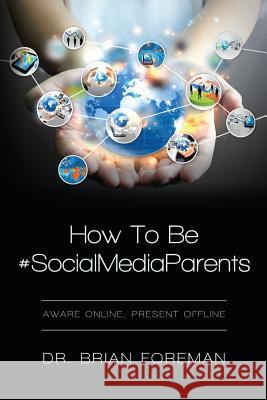How To Be #SocialMediaParents: Aware Online, Present Offline » książka
How To Be #SocialMediaParents: Aware Online, Present Offline
ISBN-13: 9781481103152 / Angielski / Miękka / 2013 / 112 str.
How To Be #SocialMediaParents is a practical guide for parents to better understand social media and how their children are using it. Children as young as 13 are allowed on Facebook, but there are some parents giving access even earlier. Game Center on Apple products allows children to connect with anyone else on Game Center, regardless of age. How does a parent decide what is right for and with their family? How does one implement the family policy without making everyone miserable? How to Be #SocialMediaParents is a resource to help with those decisions. The focus of this book is two fold. The first is to help parents better understand the technology available to their children. The second is to help parents better understand their teenagers. By learning about how teenagers develop and communicate, parents can also have an appreciation for why social media is such a draw for their teenager. Social media is a new playground for identity formation, exploring the world, and making new friendships. While the playground has been updated for teen relationships, parents are forced to either learn more about what is available to their teens or choose to ignore it. This book suggests the latter is a bad idea because we know that the playground can occasionally be an unsafe place. By explaining several of the bigger platforms, like Facebook and Twitter, Brian provides parents with user-friendly instructions for being a part of that social media platform. Once parents understand the basics of the platform, they can begin considering ways to engage others through it. There is also a special section of up and coming social media platforms on which to keep an eye. When combined with out website, www.socialmediaparents.com, parents can stay current on the latest technology, news, and trends as well. It would be a mistake however to assume this book is just about technology. Ultimately, it focuses on helping the parent use technology to enhance their offline relationships. This is critical for parent-teen relationship, for keeping children safe and for teaching teenagers about acceptable behavior online in public spaces. The website also provides communication tips and ideas for parents. After learning about teenagers and social media, the parents are led through a process that helps them create a conversation and/or contract with their children about social media. Each family has to determine what is an acceptable practice based on what they are comfortable sharing and having shared about them. By taking advantage of the resources Brian provides, parents can address concerns before they become issues, which is important, because once emotion is involved in the conversation, the chances for productive discussion and outcomes is lessened. Readers of this book can expect to have the following questions answered as they read: 1.What is the big deal about social media? 2.Is social media bigger than Facebook? 3.Why does my teenager post so much information? 4.How can I connect and communicate more effectively with them? 5.How do I keep them safe? Teenagers need healthy relationships with their parents. Communication is the key to a strong relationship. As they express themselves online, you need to be there with them. Chances are your teenager is active on social media. Are you there with them? Even if you are not interacting with them regularly through social media, you should be aware online, so that you be present offline.
Zawartość książki może nie spełniać oczekiwań – reklamacje nie obejmują treści, która mogła nie być redakcyjnie ani merytorycznie opracowana.











